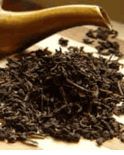Flavonoids & Theanine in Tea
 Tea is the most widely consumed beverage next to water around the world. While many simply enjoy the
taste of a hot cup of tea, scientists have discovered many medicinal properties to the popular
beverage.
Tea is the most widely consumed beverage next to water around the world. While many simply enjoy the
taste of a hot cup of tea, scientists have discovered many medicinal properties to the popular
beverage.
Tea: America’s Favorite Source of Flavonoids
Flavonoids are antioxidants found in many fruits, vegetables and beverages like tea, wine and beer. They provide a reduced risk of a series of degenerative diseases. A new study by the United States Department of Agriculture has suggested that tea is the most important source of flavonoids in the US.
The study found that adults over 19 years old consumed 190mg of flavonoids each day. Of the 190mg, tea accounted for 157mg of the flavonoid intake, followed by fruit juice at 8mg, wine at 4mg and citrus fruits at 3mg.
The USDA’s flavonoid database has recently been updated to include the flavonoid content of 393 foods, including tea.
Longer Brewing, Healthier Results
New studies show that brewing tea longer may be beneficial to your health, and milk has no effect on antioxidant properties. All teas contain flavonoids, which are known to improve cardiovascular health and thought to prevent the cancers of certain organs.
The concentration of flavonoids is much higher in teas that have been brewed for a longer period of time. A 2007 study published in the Journal of Agricultural and Food Chemistry shows that tea brewed for seven minutes had 60% more flavonoids than tea brewed for only three minutes.
Volunteers consumed two cups of black tea with water, black tea with semi-skimmed milk or water with semi-skimmed milk (a control). The tea was brewed for seven minutes. Fifty minutes after consumption, the control group showed no change, but the two black tea drinkers showed the same result, a 45% increase in flavonoids, proving milk had no effect on the level of antioxidants in the tea. Within 80 minutes the antioxidant properties in the blood rose 10% for the tea drinkers.
Some prior studies have suggested that milk does alter the antioxidant properties of tea, but in these studies, brewing time was not taken into account. The difference in brewing times was more likely the reason of varying antioxidant levels, not the addition of milk.
De-stress with Tea
Although the relaxing properties of tea have been speculated for some time, scientific evidence was lacking. Several recent human studies have shown that drinking tea four times a day for six weeks, enables people to recover faster from stressful events. This is due to a decrease in the hormone cortisol, which causes stress. Scientists speculate that ingredients in tea may affect neurotransmitters in the brain.
Theanine is a compound found almost exclusively in the tea plant, Camellia sinesis. Also found in one species of mushrooms and two other Camellia genus species, theanine is an amino acid being studied for its calming properties. Theanine comprises 50% of the amino acids in tea, and one to two percent of the dry weight of tea leaves.
In studies with rats, theanine was able to cross the blood barrier of the brain, increasing alpha-brain wave activity. This brain activity is a sign of induced relaxation. Of the four brain waves, Gamma, Theta, Alpha and Beta, Alpha waves create a relaxed physical and mental condition while the brain is awake and alert. Gamma and Theta waves are present during sleep, and Beta waves signify an awake and excited state.
Theanine is also known to improve concentration and ability to learn, support the immune system and lower cholesterol. A small study with Japanese university students showed that a relaxed and alert state of mind began about 40 minutes after the students took a 200mg theanine supplement.
More studies are being conducted to help understand the effect of theanine in tea. Visit our Tea Blog for more information on the Health Benefits of Tea
References
- United Kingdom Tea Council Health Professional Newsletter June 2007.
